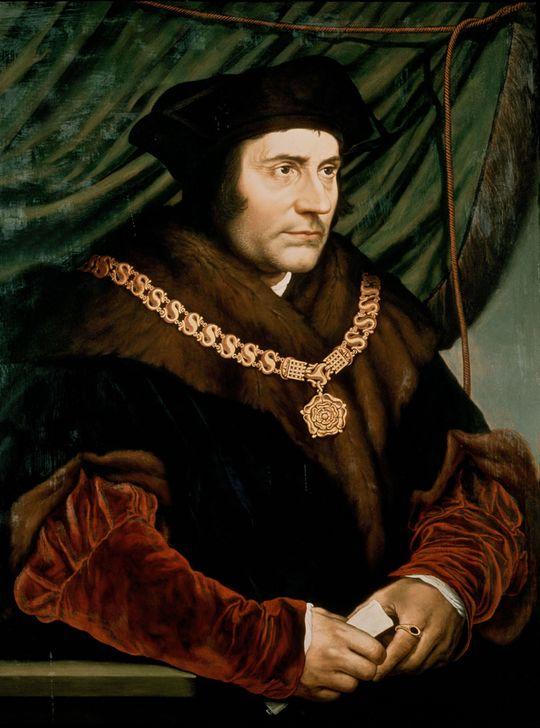Basic income: A 500-year-old idea whose time has come?

Exactly half a millennium after the idea first surfaced in Thomas More’s influential Utopia, Switzerland will hold the world’s first nationwide vote on whether to provide an unconditional - also referred to as universal - basic income (UBI) for all.
The work of fiction and political philosophy, first published in Latin in 1516, mentioned the UBI as a possible way to reduce thievery. A decade later, More’s friend, Johannes Ludovicus Vives, was the first to work out a detailed proposal. His memo to the mayor of Bruges in 1526 triggered the first such practice in the Flemish community of Ypres.
“It’s really about helping the poor,” Florian Schui, an economic historian at the University of St Gallen, said of the origins of an idea especially important since the end of the Middle Ages. The tenor of the debate has changed since then.
“Much of this basic income debate is not so much about actually changing the amount that people receive, but about rebranding it,” he told swissinfo.ch. “So that it is not (seen as) welfare anymore – but it is a basic human right.”
Since More’s time, the idea evolved in a way reminiscent of former US President John F. Kennedy’s remark that “a man may die, nations may rise and fall, but an idea lives on. Ideas have endurance without death”.
Today, supporters will hope that the notion of giving every citizen some money regularly finally rises to the level of Victor Hugo’s assertion that “no army can withstand the strength of an idea whose time has come”.

More
A basic income for all – the issue before Swiss voters
The general idea is for governments to provide citizens with a basic monthly income, without requiring them to work and regardless of other income, according to the Belgium-based Basic Income European Network (BIEN).
Proponents argue it is the surest and fairest way of relieving poverty and boosting employment. However, there are a variety of options – and sticking points – to work out. These include the exact source of the funds, and whether and how to offset other types of government assistance, such as social security or welfare benefits.
An idea over time
The idea of the UBI was debated in the 16th and 17th centuries among prominent academics at the School of Salamanca, who grappled with poverty relief and other ramifications of Spain’s colonial expansion in Latin America. In England, the Elizabethan Era’s “poor law” of 1576 provided work for people who wanted it, but could not find a job.
Among French intellectuals concerned with an individual’s right to exist, Montesquieu’s 1748 Spirit of the Laws asserted that a nation “owes all its citizens a secure subsistence, food, suitable clothes and a way of life that does not damage their health”.
English writers Tom Paine and Thomas Spence, concerned with natural rights in the 1790s, advocated the idea of a basic income. Paine’s main concern was for helping the elderly and parents of young children. At the same time, French Marquis de Condorcet argued for it as a form of social insurance to cut poverty and inequality.
Their ideas fed into modern development of Europe’s welfare and social insurance systems, such as pensions and health insurance under Otto von Bismarck, Germany’s first chancellor, from 1871 to 1890. These systems, however, focused more on the notion that a person is entitled to social benefits than to a basic income.
Modern practices
Flash forward to the 1970s, when variations of a universal basic income took root in North America:
• An experiment in Dauphin, Manitoba gave cash to families from 1974 to 1979. Education improved, working hours for new mothers and teenagers dropped, and fewer people suffered work injuries.
• Alaska set up a permanent fund in 1976 that converts the state’s oil revenue into a dividend sent every year to everyone, regardless of age, who has been an official resident for at least six months.
Other recent examples:
• German aid groups sponsored a pilot project that provided cash in a Namibian village from 2008 to 2009. More children went to school and crime dropped. Financial help continued until early 2012.
• Finland’s government plans to begin a basic income pilot project from January 2017.
• Utrecht, Tilburg and other cities in the Netherlands are experimenting with or considering the idea.
• The Scottish National Party backed the idea to replace the current welfare system and agreed it is worthy of consideration when designing a welfare system for an independent Scotland.
• The northern Italian city of Livorno in May decided to introduce a basic income on a six-month trial basis. At a national level, the Cinque Stelle movement put forward a proposal in 2013, which is pending in a Senate committee since February 2015.
• The parliament of the Swiss city of Lausanne last month called on the local council to launch a trial with an unconditional basic income.
The Swiss vote
At a national level in Switzerland, the idea is being tested in a people’s initiative that does not specify exactly how much should be given.
However, the initiative’s founders would like to see every legal resident get about CHF2,500 ($2,566) a month regardless of other wealth or employment. They propose CHF625 ($641) a month for every child.
The organisers of the initiative staged a pricey publicity stunt in Zurich’s main station in March, handing out CHF10 ($10) notes to crowds of eager commuters during morning rush hour. They say their aim is to allow people to choose how they want to live their own lives, without making choices based on financial necessities.
Schui, the economic historian, said the debate reflects “two fundamentally different strands of thought” toward the poor: Are they responsible for their plight? Alternatively, is the economic system to blame for fewer hours of work to go around?
More’s Utopia reflected a religious view that people have been burdened with work since the Garden of Eden, but that there was no need for it in humankind’s original condition. Since the Industrial Revolution, people have become accustomed to the idea that output can survive or increase with decreasing amounts of labour.
The question, as Schui put it, becomes what to do with that kind of progress.
“I think it’s harking back to the post-war model, that sort of golden age of capitalism, with a very strong growth rate, but a high tax rate, and a generous welfare system,” he said. “I think it’s more nostalgia for the post-war period than it is for Thomas More, or religion.”
With input from Sonia Fenazzi, Urs Geiser

In compliance with the JTI standards
More: SWI swissinfo.ch certified by the Journalism Trust Initiative










You can find an overview of ongoing debates with our journalists here . Please join us!
If you want to start a conversation about a topic raised in this article or want to report factual errors, email us at english@swissinfo.ch.